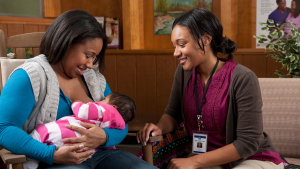
Breastfeeding, peer support and community… Most people are well aware that in order for mothers to meet their breastfeeding goals, they need individualised support. This support needs to be everywhere – the postnatal ward, community, and in every hospital setting that may see a breastfed child. It’s a no-brainer.
If there is no support, or the support does not meet the needs of the mother and child, there is a risk they will not meet their personal breastfeeding goal. That’s why I am such a big fan of peer support. A recent article by Chang et al (2022) conducted a systematic review of studies that explored peer support – looking at the experiences and views of not only mothers, but also health professionals and the peer supporters themselves. The peer supporters were variously working in maternity wards, community settings including WIC, and some neonatal units.
The women found the peer supporters approachable, kind, reassuring, non-judgmental and encouraging. Having interactions from the peer supporters boosted their self-esteem and raised their confidence in their ability to be able to breastfeed. It also reduced social isolation and provided an opportunity for emotional connection. The peer supporters were also able to give practical information and manage realistic expectations in a mother-to-mother relationship. Many women commented on how much a comforting hug meant to them at a low point.
The peer supporters reported on the benefits to them – which included giving them a sense of purpose, increasing their confidence, and providing them with a high level of job satisfaction. The healthcare professionals agreed with the mothers on many points and added that the peer supporters were more relaxed and approachable than they were, and also had more time to be able to sit down with a mother and listen to her, whereas the healthcare professionals were often short of time. There were some tensions between healthcare professionals and peer supporters – which Amy Brown also found in her recent study of lactation supporters (you can read more about it in her excellent book The Compassion Code published by our company Thought Rebellion earlier this year).
If you’ve followed me for a while, you’ll know I always ask the question ‘what about paediatrics?’ with studies like these. It’s always notable how much good stuff is happening in every clinical area except paediatrics. I would absolutely love to see peer supporters working on the paediatric ward. While these tensions are likely to be experienced in this setting as well, I really think it could be overcome by 1) specific training for peer supporters and healthcare professionals about understanding and valuing the scope of practice of each other’s roles, 2) clear guidelines, and 3) paediatric-specific training.
When I set up the Breastfeeding the Brave group on Facebook, the idea was to provide a safe place for parents to be supported with breastfeeding or providing breastmilk for their sick or medically complex children. With so little research into how to support sick children, sometimes the value in chatting to another parent who has walked a similar path is immense. That’s why I set up the Paediatric Breastfeeding Directory early this summer. The vision is a freely available directory where parents can reach out for peer support, or identify health and lactation professionals with sufficient appropriate expertise. Please do sign up if you’re a dual-qualified paediatric clinician and lactation advocate or a parent of a medically complex breastfed child, and if you want to read more about it, just visit the link here.
So, the bottom line is everyone needs support. We just need to make sure the support is more equitable and now, so there are no gaps in service provision. We also need to value and support our supporters. If you’re a peer supporter in any setting reading this – please know how much you are valued, not only by the struggling health care systems you prop up, but especially by the mothers and little ones you are a lifeline for.
For more information about breastfeeding sick children, check out my book Breastfeeding the Brave as well as the short online self-paced course by the same name.

Leave A Comment
You must be logged in to post a comment.